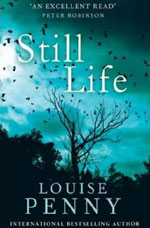It happened far too often. Normally death came at night, taking a person in their sleep, stopping their heart or tickling them awake, leading them to the bathroom with a splitting headache before pouncing and flooding their brain with blood. It waits in alleys and metro stops. After the sun goes down plugs are pulled by white-clad guardians and death is invited into an antiseptic room.Still Life, by Louise Penny, is a wonderful palate cleanser of a book (a little too much SF for me lately). We've had cool, rainy days lately, and the leaves are starting to think about turning. The perfect backdrop for a perfect cosy mystery.
But in the country death comes, uninvited, during the day. It takes fishermen in the their longboats. It gabs children by the ankles as they swim. In winter it calls them down a slope too steep for their budding skills, and crosses their skis at the tips. It waits along the shore where snow met ice not long ago but now, unseen by sparkling eyes, a little water touched the shore, and the skater makes a circle slightly larger than intended. Death stands in the woods with a bow and arrow at dawn and dusk. And it tugs cars off the road in broad daylight, the tires spinning furiously on ice or snow, or bright autumn leaves.
Louis Penny brings death in the morning to Jane Neal, lovely, likeable old woman who'd just had a piece accepted to the community art show. And, like most of the villagers, there's a secret hidden in it.
I've read a few of Penny's novels before, but Still Life is the book that started the series of mysteries featuring Chief Inspector Gamache of the Sûreté du Québec. Her first book is every bit as assured in tone, plotting, character, and wit as the others I've read. There's only less Montreal (where Gamache's home and office are) and less departmental politics.
Excerpt.
"Life is change. If you aren't growing and evolving you're standing still, and the rest of the world is surging ahead. Most of these people are very immature. They lead 'still' lives, waiting."Perhaps the sentiment is a little anti-zen. More like stagnant stillness as opposed to being in stillness. But worth thinking about, no?



No comments:
Post a Comment